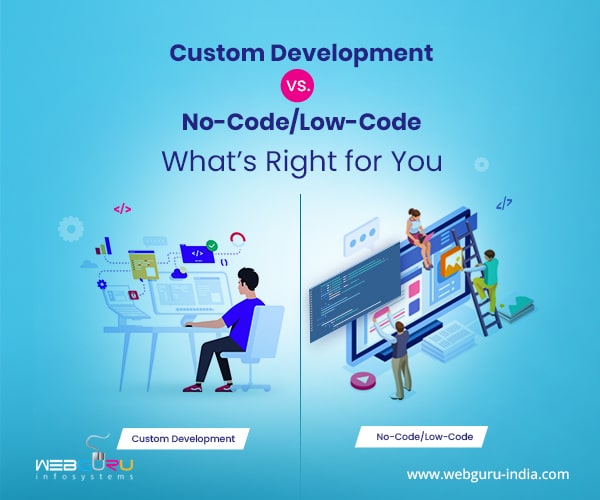Home Blog Mobile App Development Custom Development vs. No-Code/Low-Code: What’s Right for You
Custom Development vs. No-Code/Low-Code: What’s Right for You
- 12 May / 2023
- 1,921 views
- 5 Min Read

Businesses today have the option of multiple development approaches when it comes to mobile and web application development. Traditionally, there was only the custom development approach – a group of developers creates an application from scratch. However, there are more options today, and a full-fledged knowledge of coding may not be necessary anymore. Low-code and no-code development have turned out to be new alternatives that many companies are going for. They can provide faster and more affordable development.
In this blog, we’ll look at what these 3 approaches to development mean, and how they compare against each other.
No-code Development
No-code development allows even non-technical people with no programming experience or coding knowledge to build applications using a few specialized platforms.
Instead, these platforms offer simple drag-and-drop interfaces with picklist selection boxes and spreadsheet imports. There are pre-built modules and templates already in the platforms to play around with. Such no-code development platforms have been built with ease-of-use and simplified workflows in mind, and modern platforms heavily use automation to help with the development process.
No-code platforms are fast, accessible, and affordable – this makes it a great choice for small businesses. In fact, not just small businesses, but also individuals use such platforms for developing simple business solutions to save time and money. Simple business logic can be easily integrated into existing content on the UI, and the backend gets automatically taken care of. This makes it a great option for quick development.
That said, no-code development might not be suitable for complex or very niche applications. Such platforms generally serve generic functionalities, and custom requirements may become difficult to integrate. In case more complex development is required, you may need to buy additional modules, which drive up expenses significantly.
Starting from basic business websites to more complex business application and eCommerce development, there are several no-code platforms available to choose from. Airtable, ServiceNow App Engine, and Appy Pie are some high-quality no-code platforms.
Low-code Development
This is very similar to no-code development. However, this approach can let you create slightly more complex applications if you have some coding knowledge. This functionality is usually built into the no-code platforms, so such platforms can be used as no-code and low-code interchangeably. Mendix, OutSystems, and Appian are popular low-code development platforms that are preferred by businesses worldwide.
This approach can help you develop more complex applications quickly by leveraging a few specialized skills. Although this approach is arguably more flexible compared to a no-code approach, it is based on pre-built modules. This makes its appeal limited when it comes to complex custom functionalities and integrations.
Custom Development
Custom development is the traditional way of creating applications. It involves a full-stack development team that works to create unique solutions for their client. It is still the most popular option as it offers the most amount of flexibility, and applications can easily be manipulated to serve unique requirements and functionalities. Custom development can achieve what is otherwise difficult to build through no-code/low-code platforms. So, it’s generally used by bigger companies and enterprises to build unique apps. It gives the owners complete control over how the app looks and how it behaves.
Custom development of applications is both time taking and expensive. It requires ongoing testing, analysis, and maintenance, which add to the project expenses.
Low-code Development vs Custom Development
Here’s a comparison of no-code/low-code development against custom development to help you have a better idea.
1. Skill Requirements & Costs
Low-code/no-code development requires absolutely minimal programming skills. So businesses using these approaches don’t need to hire a full-stack development team and can build their applications in-house. This allows them to create applications at a fraction of what custom development would have cost. No-code platforms particularly are very popular among individuals looking to make simple applications with common business logic.
Custom development can be used for applications with unique business logic and an innovative user interface. It needs to be scalable to accommodate any future expansions, and needs a team having expertise in database management and front-end/back-end coding.
Additionally, the application needs to be scalable to accommodate future expansions of the business. It also needs to be robust enough to handle user loads that might increase from time to time. Thus, the application development team should include experienced analysts and hosting server experts. This increases the cost of custom application development. However, if you are looking to go to market with a unique, robust, and scalable application, custom development is the way to go.
Besides, the cost of custom application development is a one time investment. Most of the no-code/low-code applications are SAAS products where you need to keep on paying money to the platform on a regular basis as long as you keep using it.
2. Time-to-Market
No-code/low-code development offers a significantly faster time-to-market than custom development. Since these platforms offer pre-built templates and modules and the backend is handled automatically, the bulk of the time will be taken up with ideation and designing. This simplified workflow ensures faster development.
On the other hand, custom development takes a longer time, say, even months to years depending on the complexity of the project.
3. Flexibility and Integrations
No-code/low-code development is very limited in terms of flexibility. Functionality extensions and additional integrations are generally expensive affairs, if at all possible. This is due to the fact that the pre-built building blocks may not support any additional third-party integrations. And you may need to code if you want to get the desired functionalities.
On the other hand, the primary idea behind custom development is full flexibility. This approach is meant to create unique applications for unique needs, and those needs may change or evolve over time. Custom development lets you create applications that you have full control over. This includes (but isn’t limited to) adding functionalities, removing them, or modifying them any way you want. Also, it’s very unlikely there will be any restrictions on third-party integrations, so you can add pretty much any feature you want.
4. Scalability and Maintenance
Similar to the previous point, it’s significantly easier to maintain and scale up/down your custom-developed application than a no-code/low-code one. Low-code/no-code platforms may provide limited maintenance tools and performance optimization opportunities. Basically, you’re going to be at the whim of the platform you have used, and not have real control over how big your app gets to be.
However, with custom development, every individual part of your project can be tweaked and worked on separately. This makes maintenance and scaling a lot easier for developers.
5. Security
As with the previous case, you’re once again at the whim of your development platform when it comes to the security of no-code applications. You will only have very limited control over the security features of your app, most of which is generally decided by the platform. Additionally, if the platform itself has bugs or doesn’t properly adhere to industry standards, it puts your application and all of its data at risk.
With custom development, you have full control over app security. You may outline your own security specifications, and scale it up however you see fit as your application grows. Additional third-party security integrations shouldn’t be a problem either.
6. Ownership Issues
Custom development allows you to have total control over the application. And even if you use integrations and external libraries, the final product is unique. You can patent it as such, and have complete ownership over the application and its source code.
You can have total ownership over the application by patenting it and can transfer the source code to another platform as well. And since you’re using building blocks that have been provided by the platform, you may not have full control over your intellectual properties and source code.
Conclusion
No-code, low-code, custom development – all three are equally valid options for web and mobile application development. No-code/low-code are obviously the easier and more affordable options, but they also provide serious limitations on flexibility and uniqueness. Although custom development is considerably time-consuming and more expensive, it allows you full control over the product. Finally, the type of application development you choose would depend on your requirements and budget. So, do consider the points discussed above before arriving at a decision.
If you’ve decided that you want full control of your application and would like the custom development approach, you need a team with the requisite experience and expertise. At Webguru Infosystems, our team of developers regularly makes high-quality applications for a wide variety of industries. We can make one for you too! Contact us today for a free consultation.
3 comments
Leave a Reply

-
1000+
Happy
Clients -
25+
Countries
Served -
19+
Years of
Trust









Nowadays, the low coding becomes trending while it saves developing time and cost for the Web Application Development Company In India.
I really like and appreciate your blog article.Much thanks again.
Insightful breakdown Rajdip! I’m torn between the flexibility of custom development and the ease of no-code platforms. Excited to read more from you!